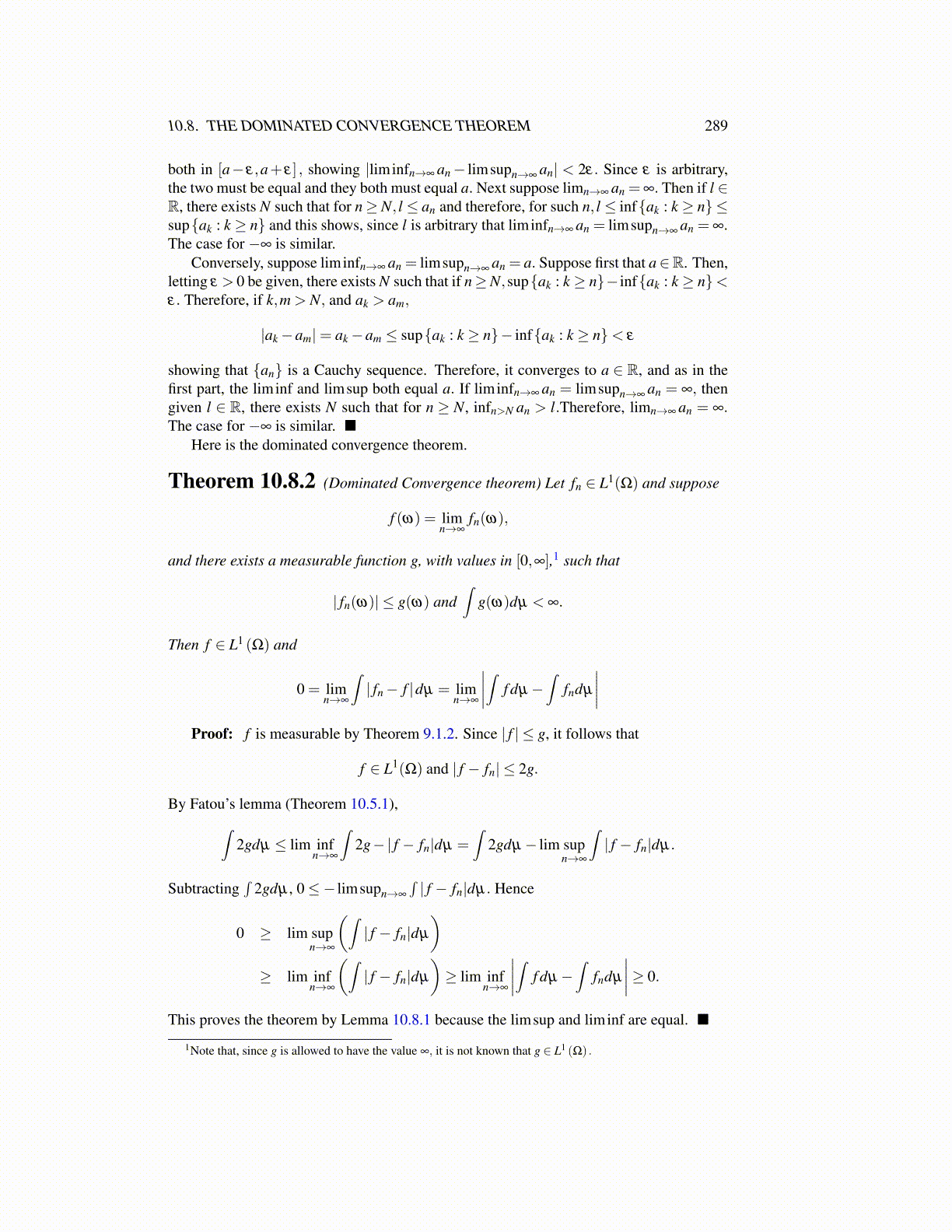
10.8. THE DOMINATED CONVERGENCE THEOREM 289
both in [a− ε,a+ ε] , showing |liminfn→∞ an− limsupn→∞ an| < 2ε. Since ε is arbitrary,the two must be equal and they both must equal a. Next suppose limn→∞ an =∞. Then if l ∈R, there exists N such that for n≥ N, l ≤ an and therefore, for such n, l ≤ inf{ak : k ≥ n} ≤sup{ak : k ≥ n} and this shows, since l is arbitrary that liminfn→∞ an = limsupn→∞ an = ∞.The case for −∞ is similar.
Conversely, suppose liminfn→∞ an = limsupn→∞ an = a. Suppose first that a∈R. Then,letting ε > 0 be given, there exists N such that if n≥N,sup{ak : k ≥ n}− inf{ak : k ≥ n}<ε. Therefore, if k,m > N, and ak > am,
|ak−am|= ak−am ≤ sup{ak : k ≥ n}− inf{ak : k ≥ n}< ε
showing that {an} is a Cauchy sequence. Therefore, it converges to a ∈ R, and as in thefirst part, the liminf and limsup both equal a. If liminfn→∞ an = limsupn→∞ an = ∞, thengiven l ∈ R, there exists N such that for n ≥ N, infn>N an > l.Therefore, limn→∞ an = ∞.The case for −∞ is similar. ■
Here is the dominated convergence theorem.
Theorem 10.8.2 (Dominated Convergence theorem) Let fn ∈ L1(Ω) and suppose
f (ω) = limn→∞
fn(ω),
and there exists a measurable function g, with values in [0,∞],1 such that
| fn(ω)| ≤ g(ω) and∫
g(ω)dµ < ∞.
Then f ∈ L1 (Ω) and
0 = limn→∞
∫| fn− f |dµ = lim
n→∞
∣∣∣∣∫ f dµ−∫
fndµ
∣∣∣∣Proof: f is measurable by Theorem 9.1.2. Since | f | ≤ g, it follows that
f ∈ L1(Ω) and | f − fn| ≤ 2g.
By Fatou’s lemma (Theorem 10.5.1),∫2gdµ ≤ lim inf
n→∞
∫2g−| f − fn|dµ =
∫2gdµ− lim sup
n→∞
∫| f − fn|dµ.
Subtracting∫
2gdµ , 0≤− limsupn→∞
∫| f − fn|dµ. Hence
0 ≥ lim supn→∞
(∫| f − fn|dµ
)≥ lim inf
n→∞
(∫| f − fn|dµ
)≥ lim inf
n→∞
∣∣∣∣∫ f dµ−∫
fndµ
∣∣∣∣≥ 0.
This proves the theorem by Lemma 10.8.1 because the limsup and liminf are equal. ■
1Note that, since g is allowed to have the value ∞, it is not known that g ∈ L1 (Ω) .